Divorce can impact all members of a family, including children. Understanding and addressing the potential risks to a child’s mental health during and after a divorce is crucial in ensuring their well-being.
Children may experience a range of emotional, psychological, and behavioral changes as a result of divorce. It is important for parents to be aware of these changes and take proactive measures to support their children during this challenging time.
One of the most significant risks associated with divorce is the potential impact on a child’s mental health. Children may experience feelings of sadness, confusion, and grief, which can lead to long-term emotional and psychological consequences if not addressed.
It is important for parents to understand how divorce can impact their children and take steps to minimize the risks. This includes providing emotional support, maintaining routines, seeking professional help if needed, and fostering a supportive environment.

- Understanding the Effects of Divorce on Children
- Emotional Challenges Faced by Children of Divorce
- Behavioral Changes in Children After Divorce
- Psychological Impact of Divorce on Children
- Factors That Influence a Child’s Response to Divorce
- Preemptive Strategies to Protect a Child’s Mental Health
- Support Systems for Children of Divorce
- Long-Term Impact of Divorce on a Child’s Mental Health
- Conclusion


Key Takeaways
- Divorce can have a significant impact on a child’s mental health.
- Children may exhibit emotional, psychological, and behavioral changes as a result of divorce.
- It is important for parents to provide emotional support and maintain routines during this challenging time.
- Seeking professional help and fostering a supportive environment can help mitigate the risks of divorce on a child’s mental health.
Understanding the Effects of Divorce on Children
Divorce is never easy for any person involved, especially children. The effects of divorce on children can be manifold and impactful, ranging from emotional to psychological and behavioral changes.
One of the most common effects of divorce on children is the emotional distress they may experience. Children may feel overwhelmed by sadness, confusion, and even anger as they try to cope with the reality of their parents’ separation.
Psychological changes are also commonly observed in children of divorce. Anxiety, depression, and low self-esteem are among the potential issues that may arise during and after a divorce. It’s important for parents to be aware of these potential risks and to take steps to mitigate them.
Behavioral changes are another common effect of divorce on children. Children may exhibit aggression, act out, withdraw, or experience changes in academic performance. It’s essential for parents to understand that these changes are not necessarily the result of bad behavior but rather a reaction to the significant life changes they are experiencing.
It’s worth noting that not all children will experience these effects of divorce, and some may even adapt well to the situation. However, understanding the potential effects is crucial in helping parents provide the necessary support and guidance to their children.
To further understand these effects of divorce on children, let’s take a look at the following table:
| Effects of Divorce on Children | Description |
|---|---|
| Emotional Distress | Children may feel sadness, confusion, and anger |
| Psychological Changes | Children may experience anxiety, depression, and low self-esteem |
| Behavioral Changes | Children may exhibit aggression, act out, withdraw, or experience changes in academic performance |
As you can see, divorce can significantly impact a child’s mental health and well-being. It’s essential for parents to be aware of the potential risks and to take steps to protect their children’s mental health. In the following sections, we will explore these risks in more detail and provide strategies for preemptive care and ongoing support.
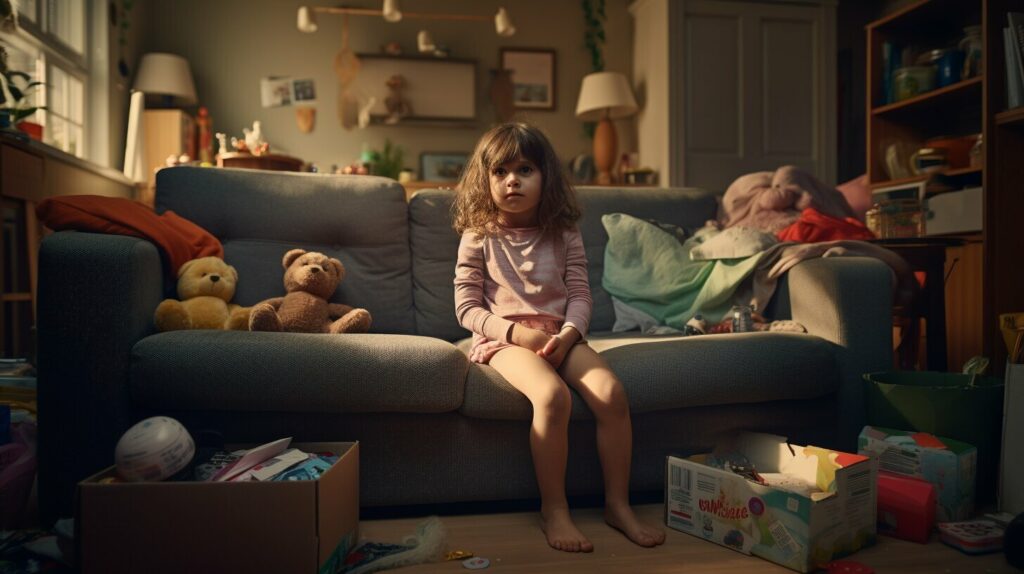

Emotional Challenges Faced by Children of Divorce
Divorce can be a traumatic experience for children. It is common for children of divorce to experience a range of emotions, including sadness, anger, confusion, and grief. These emotional challenges can have a profound impact on a child’s mental well-being and should not be ignored.
Children may experience a sense of loss and feel like they have little control over their lives. This can lead to feelings of helplessness and hopelessness.
“I was so sad when my parents got divorced. I didn’t really understand what was happening, and I felt like my world was falling apart. I missed having my family all together.” – Sarah, age 9
It is important to acknowledge and validate a child’s feelings during this difficult time. Encouraging them to express their emotions in a healthy way can help them process their feelings and cope with their new reality.


Children may also feel like they are caught in the middle of their parent’s conflict. They may feel pressure to take sides or feel like they have to choose between their parents. This can cause additional stress and anxiety for the child.
“I didn’t want to hurt either of my parents’ feelings, so I tried to keep everything to myself. But it was really hard because I felt like I had to choose between them. I didn’t want to choose.” – Michael, age 11
Parents can help their children navigate this difficult situation by ensuring that they do not put them in the middle of their conflict. They should avoid speaking negatively about the other parent in front of the child and should work to maintain a civil and cooperative relationship.
It is also important to establish a sense of stability and routine for the child. This can help provide a sense of security and predictability during an otherwise uncertain time.
“My mom and dad made sure that I still had my normal routine after they got divorced. I still had my soccer practice and my piano lessons, and it helped me feel like everything was going to be okay.” – Emma, age 8
Conclusion
Divorce can be a difficult and emotional experience for children. They may experience a range of emotions, including sadness, anger, confusion, and grief. It is important for parents to acknowledge and validate their child’s feelings, establish a sense of stability and routine, and avoid putting the child in the middle of their conflict. By taking these steps, parents can help protect their child’s mental well-being during and after a divorce.
Behavioral Changes in Children After Divorce
Divorce can have a profound impact on a child’s behavior. In fact, it is common for children to exhibit changes in their behavior during and after a divorce.
One of the most prominent behavioral changes is aggression. Children may become more aggressive due to the stress and frustration caused by the divorce. They may also act out in other ways, such as breaking rules or engaging in risky behaviors.
On the other hand, some children may become withdrawn and emotionally distant. They may exhibit signs of depression, such as a lack of interest in activities they used to enjoy or difficulty sleeping.
Academic performance can also be affected, as some children may struggle to focus on their studies during this difficult time. It is important for parents and guardians to be aware of these changes and provide support and guidance to children as needed.
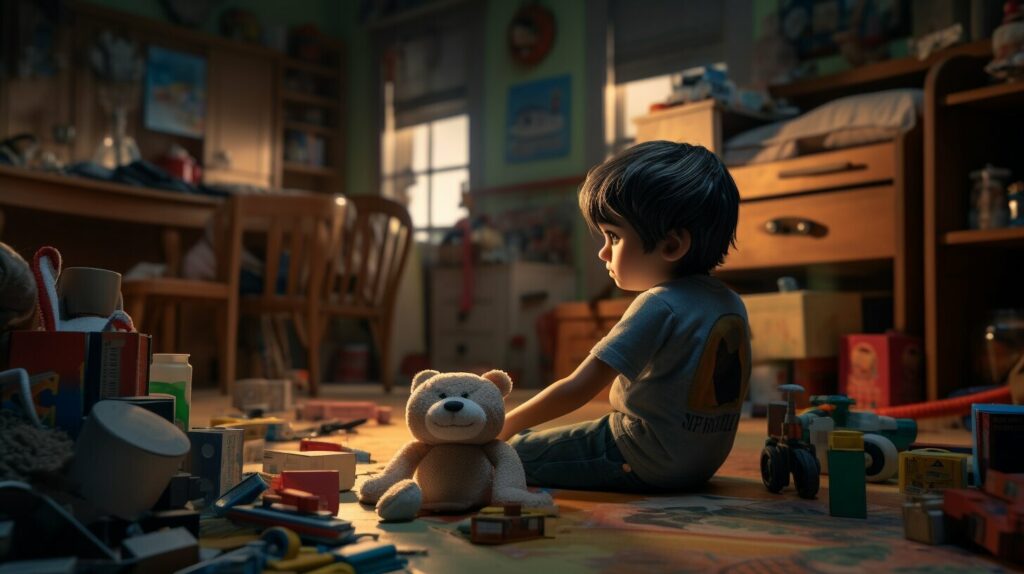

It is important to note that not all children will exhibit the same behavioral changes after a divorce. Every child is different, and their response to divorce may vary depending on a variety of factors, such as their age, personality, and the level of conflict between their parents.
Preemptive Strategies to Help Children Cope
While it may not be possible to completely prevent behavioral changes in children after a divorce, there are preemptive strategies that can help mitigate some of the negative effects.
- Encouraging open and honest communication between children and parents can help build trust and create a sense of safety and stability.
- Maintaining routines and structure can help children feel more secure and provide a sense of normalcy during a time of change.
- Seeking therapy or counseling for children can provide them with a safe space to express their feelings and emotions, and provide them with the skills to cope with the changes in their family dynamic.
- Fostering a supportive environment, whether it be through the involvement of extended family members or participation in support groups, can help children feel less isolated and alone during this challenging time.
By implementing these preemptive strategies, parents and guardians can help children navigate the changes that come with divorce and minimize any negative impact on their behavioral and emotional well-being.
Psychological Impact of Divorce on Children
Divorce can have a significant psychological impact on children, affecting their emotional well-being and mental health. The effects of divorce can vary by individual, but research has identified some common psychological consequences that children of divorce may face.
Increase in Anxiety
One of the most commonly observed psychological effects of divorce on children is an increase in anxiety levels. Children may experience a range of anxiety symptoms such as difficulty sleeping, separation anxiety, or social anxiety. These symptoms can be long-lasting and may require professional intervention.
Depression and Low Self-esteem
Children of divorce are also at higher risk for developing depression and low self-esteem. They may blame themselves for the divorce or feel a sense of loss and sadness due to the changes in their family structure. These feelings can lead to a negative self-image and a lack of confidence in their abilities.
Behavioral Problems
Children of divorce may also exhibit behavioral problems such as acting out, aggression, or withdrawal. These changes in behavior may be due to a sense of loss or confusion about the family structure, and may also be a coping mechanism for dealing with the stress of the divorce.
Long-term Consequences
The psychological impact of divorce on children can have long-term consequences that can affect their mental health into adulthood. For example, children of divorce may have difficulty forming and maintaining healthy relationships, may struggle with trust issues, and may experience ongoing anxiety and depression throughout their lives.
It is important for parents, caregivers, and other supportive adults to be aware of these potential psychological consequences and to take steps to address them. Seeking professional help, maintaining open communication, and creating a supportive environment can all be effective strategies for protecting a child’s mental health during and after a divorce.
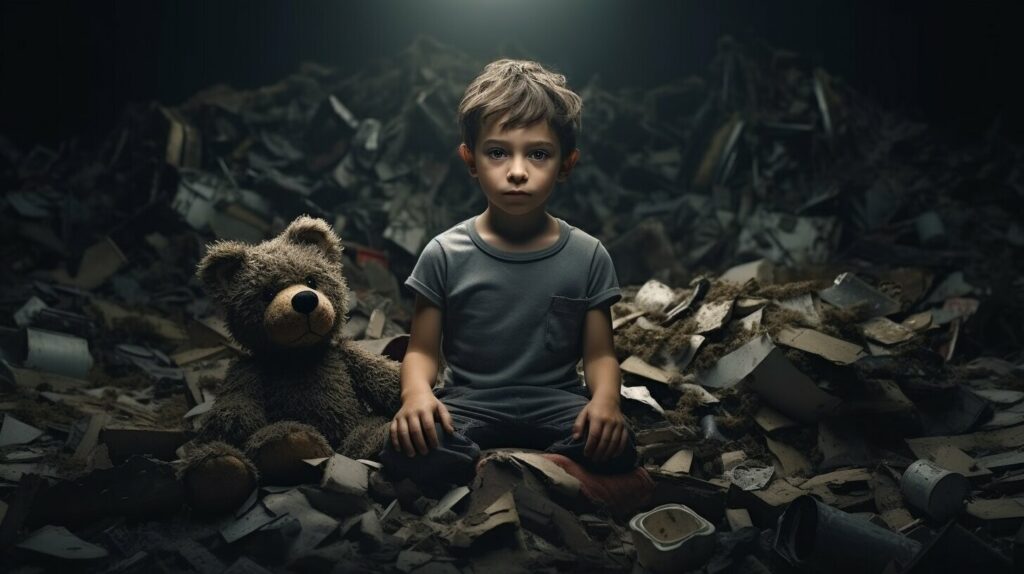

“The psychological impact of divorce on children can have long-term consequences that can affect their mental health into adulthood.”
Factors That Influence a Child’s Response to Divorce
The way a child responds to a divorce can vary from one individual to another. Many different factors can influence a child’s response, and parents should be aware of these factors to help support their child’s mental health. Understanding these factors can enable parents to take preemptive measures to minimize the negative effects of divorce on their child.
Age
The age of a child can significantly impact their response to divorce. Younger children may have difficulty understanding the separation and may struggle with feelings of abandonment. Older children, on the other hand, may feel a sense of responsibility or become caught in the middle of parental conflicts.
Temperament
A child’s temperament can also impact how they respond to divorce. Children with a more resilient temperament may adapt more easily to the changes brought about by divorce, while more sensitive children may experience greater difficulty coping.
Parental Conflict
Parental conflict can have a profound impact on a child’s response to divorce. Children who are exposed to frequent arguments or conflict between parents may experience higher levels of distress and have more difficulty adjusting to the changes in their family dynamic.
Support Systems
The support systems available to a child can significantly impact their response to divorce. Children who have access to supportive adults, such as extended family members, teachers, or mental health professionals, may experience less emotional distress during and after a divorce.
Table: Summary of Factors Influencing a Child’s Response to Divorce
| Age | Temperament | Parental Conflict | Support Systems |
|---|---|---|---|
| Different age groups may have unique challenges in coping with the changes brought about by divorce. | Children with a more sensitive temperament may struggle more with the changes brought about by divorce. | Exposure to parental conflict can be very distressing for children and may impact their mental health. | Supportive adults can help to mitigate the negative effects of divorce on a child’s mental well-being. |
By understanding the unique factors that influence how a child responds to divorce, parents can take steps to minimize the negative effects on their child’s mental health. Encouraging open communication, providing a supportive environment, and involving mental health professionals or other supportive adults can help to protect a child’s mental well-being during and after a divorce.
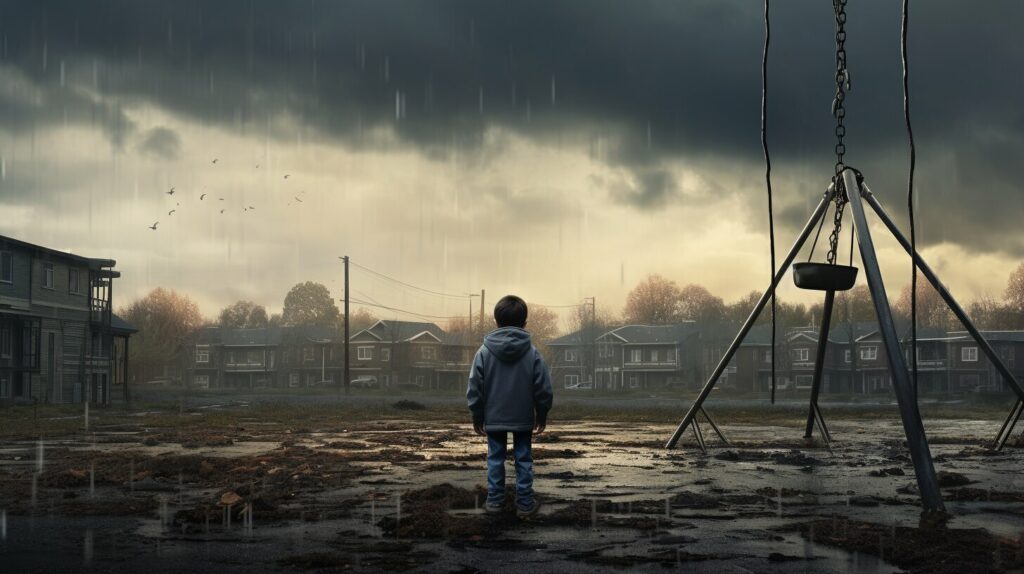

Preemptive Strategies to Protect a Child’s Mental Health
Divorce can take a toll on a child’s mental health, but there are preemptive strategies that can help protect them during and after the process.
Effective Communication: Open communication is an essential part of minimizing the negative impact of divorce on children. It’s crucial to be honest with them and provide age-appropriate explanations for what’s happening. Make them feel included and remind them that they are not alone.
Maintain Routines: Children benefit from a stable routine as it helps them feel secure and minimize anxiety during a time of change. Try to maintain their daily schedule as much as possible and involve them in decision-making to make them feel engaged and positive.
| Tip: | Creating a visual schedule or to-do list can be helpful for younger children, providing them with structure and stability. |
|---|---|
  |
Seek Therapy: Consider seeking professional help from a therapist or counselor for your child. It can help them express their feelings and work through any emotional challenges that may arise as a result of the divorce.
Foster a Supportive Environment: It’s important to provide a supportive environment for your child during and after a divorce. Encourage them to spend time with family and friends who are positive influences. Remind them they have people they can rely on for love and support.
By implementing these preemptive strategies, you can help protect your child’s mental health during and after a divorce. Remember, it’s essential to prioritize your child’s well-being and support them through this challenging time.
Support Systems for Children of Divorce
Divorce can be a difficult time for children, and having a strong support system in place is crucial to help them cope with the changes. Here are some ways that parents and caregivers can provide support:
Professional Therapy
Professional therapy can be a valuable tool for children of divorce, as it can provide a safe space for them to express their feelings and work through any emotional challenges they may be facing. A trained therapist can help children develop coping skills and provide strategies for managing difficult emotions.
Extended Family Members
Extended family members, such as grandparents, aunts, and uncles, can also be a source of support for children of divorce. These family members can provide a sense of stability and continuity during a time of change and can offer children a safe place to talk about their feelings.
Peer Support Networks
Peer support networks, such as group therapy or support groups, can be helpful for children who may feel isolated or alone during the divorce process. These networks can provide children with a sense of community and help them feel less alone in their experiences.
Consistent Communication
Consistent communication between parents and children is important to maintain a sense of stability and routine during a time of change. Parents should try to keep their child informed about any changes or updates related to the divorce and encourage their child to ask questions and express their feelings.


Ultimately, the most important thing parents and caregivers can do is to be there for their child and provide a supportive and loving environment. By maintaining open communication and seeking out professional support when needed, children can navigate the challenges of divorce and emerge with a stronger sense of resilience and well-being.
Long-Term Impact of Divorce on a Child’s Mental Health
While some children adjust well to their parents’ divorce and show little to no signs of distress, others may struggle with the emotional, psychological, and behavioral changes that come with the dissolution of their family unit. The long-term impact of divorce on a child’s mental health can vary depending on several factors, including the child’s age, personality, and family circumstances.
A study by Amato and Keith (1991) found that compared to children from intact families, children of divorce experience more emotional, social, and academic difficulties throughout their lives. Another study by Strohschein (2005) reported that children who experienced a parental divorce in their childhood were more likely to experience mental health issues such as depression, anxiety, and substance abuse in adulthood.
Factors Contributing to Long-Term Impact
Several factors may contribute to the long-term impact of divorce on a child’s mental health:
| Factor | Explanation |
|---|---|
| Age | Younger children may have difficulty understanding the reasons for the divorce and may feel a sense of abandonment, while older children may experience a sense of loss and grief as they navigate the changes in their family structure. |
| Parental Conflict | Children who are exposed to high levels of conflict between their parents may experience more negative outcomes following the divorce. |
| Support Systems | Children who have access to supportive family members, friends, and professionals may be better able to cope with the changes brought on by the divorce. |
| Level of Involvement | Children who feel caught in the middle of their parents’ conflict or who take on adult responsibilities may experience more negative outcomes. |
It is important to note that while these factors may contribute to a child’s long-term well-being after a divorce, they do not necessarily predict a negative outcome. Every child is unique and may respond differently to the challenges of divorce.
Long-Term Solutions
Several long-term solutions may help mitigate the potential negative impacts of divorce on a child’s mental health:
- Ensuring ongoing access to therapy and mental health services
- Encouraging open and honest communication within the family
- Maintaining routines and structure as much as possible
- Encouraging positive coping mechanisms such as exercise, creative expression, and social engagement
It is important to remember that while divorce can be difficult for everyone involved, there is hope for healing and growth. By acknowledging the challenges and seeking out support, parents and children can work together to build a new and fulfilling life after divorce.
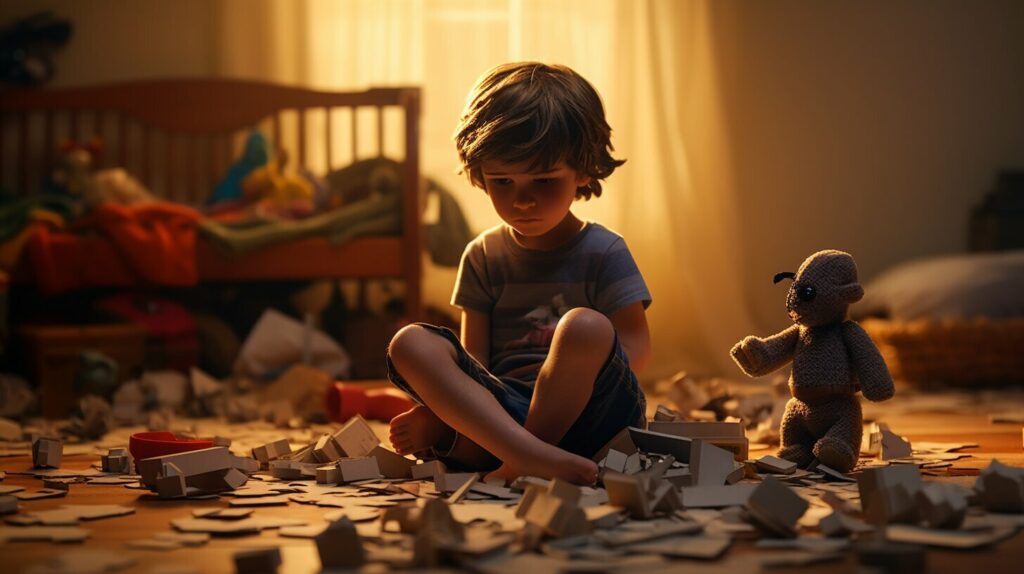

Conclusion
Divorce can have a significant impact on a child’s mental health, and it is crucial for parents and caregivers to understand the potential risks involved. Through this article, we have explored the various effects of divorce on children, including emotional, psychological, and behavioral changes.
Protecting a Child’s Well-Being
It is important to be aware of the emotional challenges that children may face during and after a divorce, such as feelings of sadness, anger, confusion, and grief. Behavioral changes, such as aggression, acting out, withdrawal, and changes in academic performance, may also be observed. Furthermore, psychological issues such as anxiety, depression, low self-esteem, and potential long-term psychological consequences may arise.
Factors and Support Systems
Factors such as the child’s age, temperament, parental conflict, and support systems can all influence a child’s response to divorce. Preemptive strategies such as effective communication, maintaining routines, seeking therapy, and fostering a supportive environment can help protect a child’s mental health. It is also important to seek support from professional help, extended family members, and peer support networks.
Lasting Effects
A divorce can have long-term effects on a child’s mental health, which is why ongoing support and intervention is necessary to help mitigate these effects. By understanding and addressing the risks to a child’s mental health during and after a divorce, parents and caregivers can take steps to protect their well-being.
Overall, it is important to approach divorce with sensitivity and awareness of the impact that it can have on a child’s mental health. With the right support and intervention, children can successfully navigate the challenges of divorce and thrive in their lives.



FAQ
How does divorce impact a child’s mental health?
Divorce can have various effects on a child’s mental health, including emotional challenges, behavioral changes, and potential long-term psychological consequences.
What are the emotional challenges faced by children of divorce?
Children of divorce may experience feelings of sadness, anger, confusion, and grief, which can impact their mental well-being.
How can divorce affect the behavior of children?
Divorce can lead to behavioral changes in children, such as aggression, acting out, withdrawal, and changes in academic performance.
What is the psychological impact of divorce on children?
Divorce can cause psychological issues in children, including anxiety, depression, low self-esteem, and potential long-term psychological consequences.
What factors influence a child’s response to divorce?
Various factors, such as age, temperament, parental conflict, and support systems, can influence how a child responds to divorce.
What preemptive strategies can protect a child’s mental health during and after a divorce?
Effective communication, maintaining routines, seeking therapy, and fostering a supportive environment are preemptive strategies that can help protect a child’s mental health during and after a divorce.
How important are support systems for children of divorce?
Support systems, including professional help, involvement of extended family members, and engagement in peer support networks, are crucial for children going through a divorce.
What could be the long-term impact of divorce on a child’s mental health?
Divorce can have potential long-term effects on a child’s mental health. Ongoing support and intervention are important to help mitigate any long-lasting impacts.





Leave a Reply